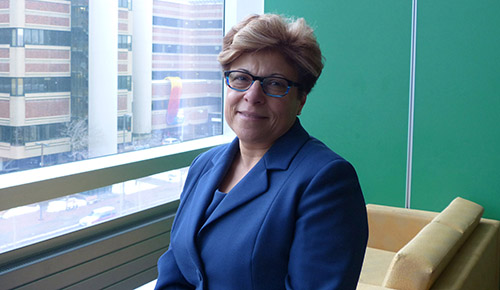
Rose Girgis, Director of Clinical Fellowships in the Faculty of Medicine & Dentistry, gains experience and expertise by stepping up for leadership roles.
In 2016, the late Faculty of Medicine & Dentistry (FoMD) Dean Richard Fedorak acted on his vision to develop a policy framework and guidelines that would improve the experience for clinical fellows at the University of Alberta. When the time to choose a leader came, Rose Girgis was ready.
Girgis first came to the U of A from Egypt in 1987, an MD credential in hand. She completed a master of sciences in biochemical genetics in the Department of Pediatrics. Then she went on to residency training in general pediatrics and endocrinology, as well as a research fellowship, eventually joining as academic staff and working her way through several pediatric leadership positions. She began improving fellowship program processes at the department level and made some impressive gains in just one year.
Encouragement from the department chair to expand her experiences, and cast her leadership net wider, made Girgis realize that she was well-supported to take on a new administrative role and embrace the opportunity of the newly-created FoMD Director of Clinical Fellowships position.
Fellowships are specialized learning experiences outside of the established structure and policies of residency programs. While the freedom and flexibility to create unique learning experiences is attractive, a lack of formal policies and guidance for those involved in the programs can be challenging. Such was the case, until very recently, with clinical fellowships at most universities across Canada.
"Every institution now is waking up to the fact that we need to have a framework," she says. "The goal in all of this is to maximize the educational experiences of fellows in a fair environment where they are all well-treated and respected," she explains. This includes examining everything from application processes, offer letters, funding, benefits and evaluations, to university wellness policies and guidelines for extensions, completions and certificates.
"It takes courage to change the culture," she says, pointing to the inevitable push back during the first phases of implementation. Nearly three years on, as the new policies roll out, Girgis beams with pride. "It's beautiful to see the more organized process and it is important to mention that the department chairs are very pleased now," she says. "They have guidance, a framework to work with and a person in leadership to go to; I have heard this so much."
Girgis is quick to honour her mentors and those who offer encouragement or support as she navigates new roles and faces challenges. In addition to the vision of Fedorak and inspiration of department chair Susan Gilmour, Girgis cites FoMD associate dean Ramona Kearney for reminding her to stay focused on the objectives and process, and department Subspecialty Postgraduate Medical Education Program Director Chloe Joynt for contributing as an integral member of the task force that prepared the fellowship policies and guidelines. Girgis also encourages others to get involved locally and beyond. "You cannot be stagnant, you have to move on to develop your career."
Girgis first came to the U of A from Egypt in 1987, an MD credential in hand. She completed a master of sciences in biochemical genetics in the Department of Pediatrics. Then she went on to residency training in general pediatrics and endocrinology, as well as a research fellowship, eventually joining as academic staff and working her way through several pediatric leadership positions. She began improving fellowship program processes at the department level and made some impressive gains in just one year.
Encouragement from the department chair to expand her experiences, and cast her leadership net wider, made Girgis realize that she was well-supported to take on a new administrative role and embrace the opportunity of the newly-created FoMD Director of Clinical Fellowships position.
Fellowships are specialized learning experiences outside of the established structure and policies of residency programs. While the freedom and flexibility to create unique learning experiences is attractive, a lack of formal policies and guidance for those involved in the programs can be challenging. Such was the case, until very recently, with clinical fellowships at most universities across Canada.
"Every institution now is waking up to the fact that we need to have a framework," she says. "The goal in all of this is to maximize the educational experiences of fellows in a fair environment where they are all well-treated and respected," she explains. This includes examining everything from application processes, offer letters, funding, benefits and evaluations, to university wellness policies and guidelines for extensions, completions and certificates.
"It takes courage to change the culture," she says, pointing to the inevitable push back during the first phases of implementation. Nearly three years on, as the new policies roll out, Girgis beams with pride. "It's beautiful to see the more organized process and it is important to mention that the department chairs are very pleased now," she says. "They have guidance, a framework to work with and a person in leadership to go to; I have heard this so much."
Girgis is quick to honour her mentors and those who offer encouragement or support as she navigates new roles and faces challenges. In addition to the vision of Fedorak and inspiration of department chair Susan Gilmour, Girgis cites FoMD associate dean Ramona Kearney for reminding her to stay focused on the objectives and process, and department Subspecialty Postgraduate Medical Education Program Director Chloe Joynt for contributing as an integral member of the task force that prepared the fellowship policies and guidelines. Girgis also encourages others to get involved locally and beyond. "You cannot be stagnant, you have to move on to develop your career."